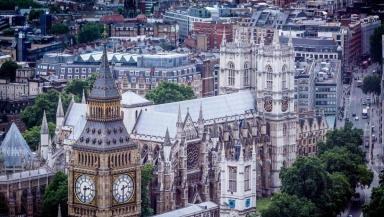
The Church of England is the state church in England. It has been so since November 1534 when the Act of Supremacy abolished papal authority in England and declared King Henry VIII as the Supreme Head of the Church of England. But does a state church mean that it is 'nationalised' – that is, owned and run by the state?
Church-state relationships have always been tricky and complex. In a theocratic state, the Church would run the state. I suspect all but a tiny minority of Christians would regard that as an appalling idea! In most modern societies there has been for many centuries a separation between church and state. In the US, that separation is largely complete, but in most European countries there still remains some formal connection between church and state - what I would call being good neighbours and good friends. In this model, the state recognises and to some degree supports the church, but does not run it or determine its doctrine. That is largely the model that has prevailed in the UK.
There is however another understanding of church-state relations some thought had already been consigned to the dustbin of history. However the events surrounding the recent decision of the Church of England Synod to bless same-sex marriages suggest that there are politicians, and perhaps clergy, who want to see a return of this type of church-state relations – what is wrongly known as Erastianism (wrongly because it is named after the Reformer Erastus, who did not teach it!). This is where the state reigns supreme over the church in matters of doctrine and ecclesiology.
In a revealing speech to Anglican Church leaders in Ghana, Archbishop Justin Welby revealed the kind of political pressure he was apparently coming under. "I was summoned twice to Parliament, and threatened with parliamentary action to force same-sex marriage on us, called in England equal marriage," he said.
Ben Bradshaw, Labour MP, who himself is gay, hinted that the time had perhaps come for disestablishment. He does not think that Parliament will do that but has threatened other 'reforms'. The Tory MP Andrew Selous, the Church's representative in Parliament, said that it was not the job of Parliament to put forward church doctrine, before then going on to suggest that that is exactly what Parliament should do: "I am conscious that Parliament's patience will not be infinite, and there have already been cross-party meetings of MPs to look at a private member's Bill to require the Church to go further."
Earlier the leader of the House of Commons, Penny Mordaunt, wrote to her local bishop, making her demands, "I hope you will back reform, allowing parishes and clergy to conduct weddings for same-sex couples or, at a minimum, enable authorised blessings." The Guardian summed it up rather well: "Mordaunt's letter adds pressure on the C of E to change its stance, based on biblical teaching, to reflect the law of the land and the weight of public opinions. LGBTQ+ members of the C of E say its refusal so far to treat them equally is institutional homophobia."
Erastianism is when we have a church governed by the state – the elites who control public opinion - and the danger of this should be obvious to everyone. If the early church had done this there would have been no early church. Jesus would not have been crucified, Paul would not have defied the Roman Empire, and the world would not have been turned upside down.
Sadly, it is not just some politicians who think that they have the right to control the doctrine of the Church of England. Some 'Christian' leaders want to use the state to enforce their own unbiblical doctrines on the Church. Two years ago, Steve Chalke argued that evangelical churches would and should face prosecution from the state for not teaching, affirming or accepting the state's new sexual doctrines – doctrines which he himself entirely agrees with.
His colleague Jayne Ozanne advocates going the same route – getting the state to ban what they call 'conversion therapy'. The trouble is that it is such a broad and ill-defined term that it can be used to prosecute anyone who advocates the teaching of Christ on marriage and sex. For example, here in Australia they are talking about making celibacy groups illegal!
In case you wonder where this is leading, the case of John Dunn, the street preacher who was arrested for citing 1 Corinthians 6, gives an ominous indication. Although he was acquitted, it was the statement from the government lawyers which set the alarm bells ringing: "There are references in the Bible which are simply no longer appropriate in modern society, and which would be deemed offensive if stated in public."
Granted, this is an extreme example. Most government attempts to control the church are with 'soft power' rather than the hard rule of law. One example is in cases where the government funds church charities, but if the church does not go along with government doctrines, they threaten to withdraw such funding. Another is where established church leaders have positions of privilege in civic and academic institutions.
It is rarely stated explicitly, but the reality is if you don't play the game, and bow to the state power, you will be out. It is ironic that so many such church leaders speak a great deal about being 'prophetic' and 'speaking truth to power', but would never dare do so if there was a danger of them losing their state-approved privileges!
As contemporary Western society drifts from its Christian foundations, we will find an increasingly authoritarian state backed by a largely compliant media, a woke corporate business sector, and an academia which has lost all concept of truth, all seeking to make sure that the church is on 'the right side of history' – their side!
If politicians want to rewrite the Bible and seek to determine church doctrine, who will stand up against this absolutist state? If church leaders go along with this, then they will, as Justin Welby told Synod, have to answer to God on the day of judgement. Where are our Pauls, Augustines, Luthers and Wilberforces?
David Robertson leads The ASK Project in Sydney, Australia. He blogs at The Wee Flea.













